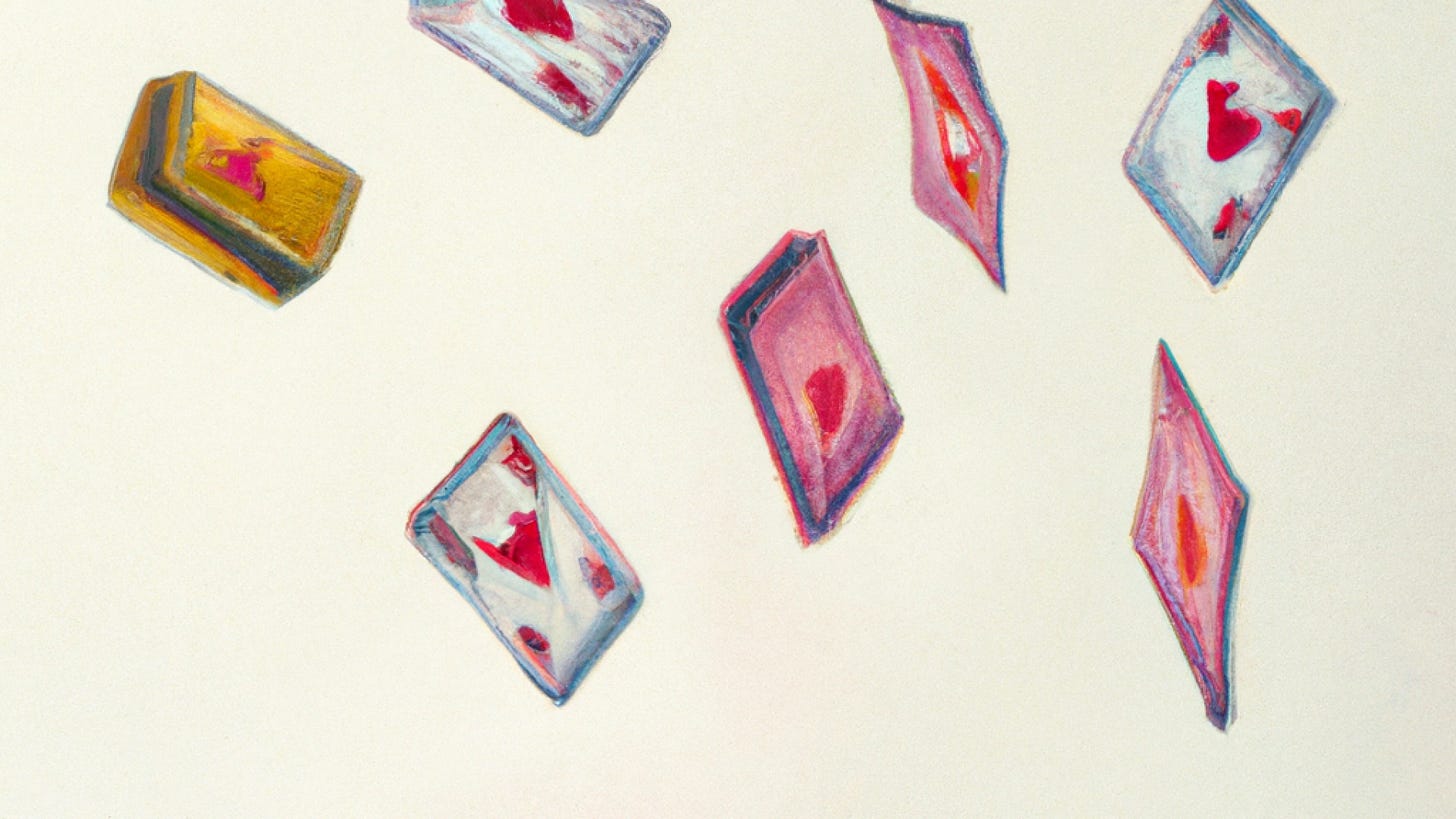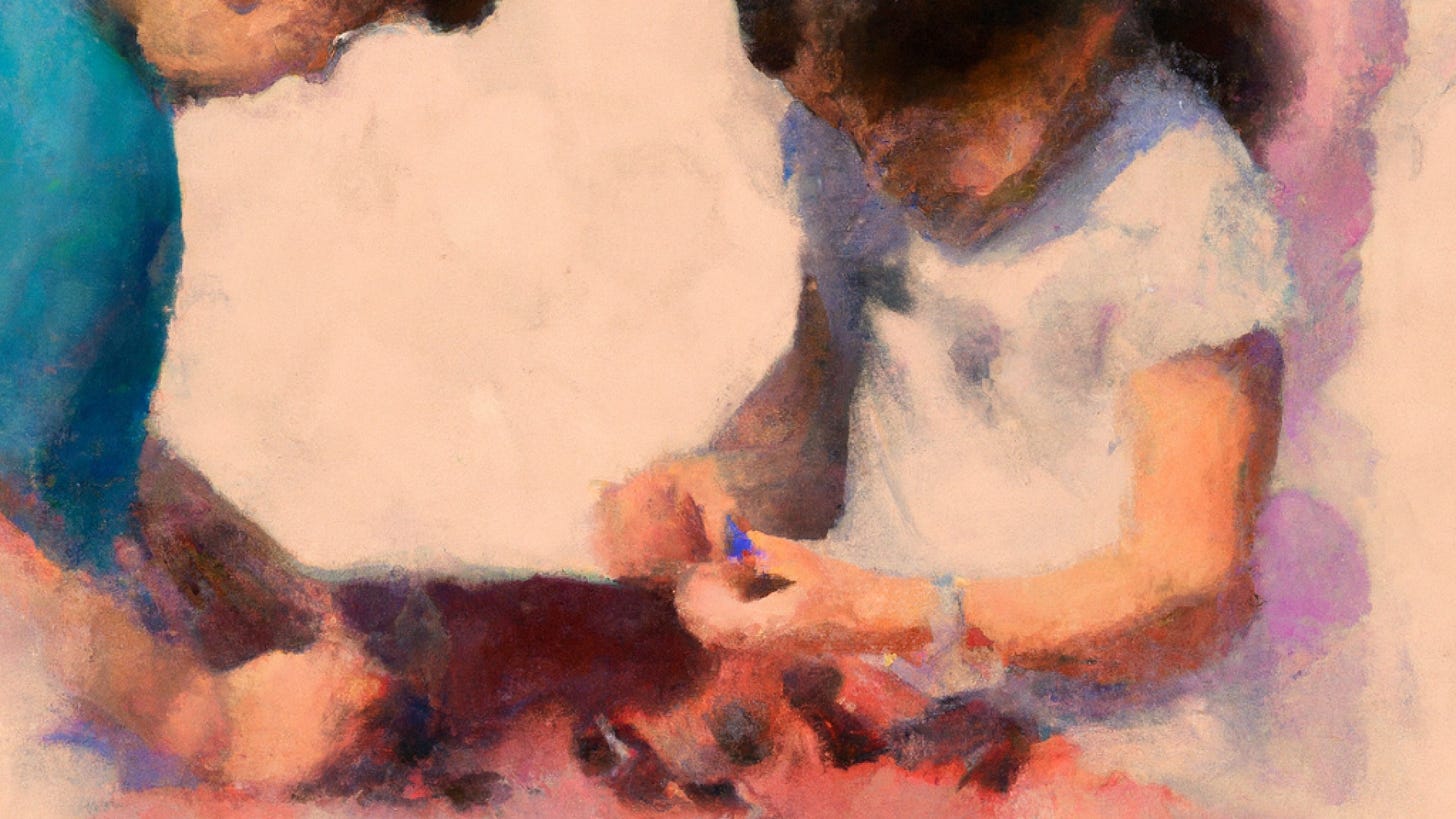Thinking Has the Character of Play
When so much of knowledge is produced through mechanical means and big data, thinking freely — playfully — becomes even more imperative.
One of the most exhilarating feelings I recall is what arises from play. As a child, the act of playing was nothing short of transcendental — a mechanism that could transport you out of your own, quotidian life into the life of others. Thinking about this now, it’s somehow shocking and truly amazing. The fact that our imagination can carry us into experiences and identities we have never, in reality, subjectively experienced. In moments of play I have been a little sister, a mother, a girlfriend, a princess, a villain, and countless other characters.
I particularly remember playing “adult” with my best friend and sister. Vera played the boyfriend, me the girlfriend (and vice versa). Amanda had an imaginary boyfriend of her own. We would “sleep late” and “eat pizza” in “the apartment we shared together”, after a very “wild night out”. It’s hilarious now to think about eight year old me imagining what it would be like to be a grown up (also, I love the detail about playing the hangover rather than the party itself). Playing was a form of freedom and discovery — an opportunity to relate with the world outside of the self.
In ‘The Disappearance of Rituals’, Byung-Chul Han argues that the compulsion of authenticity is atomising society. He says, “within the cult of authenticity, the production of self becomes a permanent activity.” Our obsession with being true to ourselves is driving a societal narrative of heightened individualism. According to Han, the compulsion to be authentic makes everything subjective, thereby intensifying narcissistic tendencies. We have lost the ability to interact socially outside of the boundaries of the self. What results is a “poverty in world, with the self simply circling around itself”.
I often think about this phenomenon when I see tourists bumbling around Barcelona. I’ve lived on the right of the Eixample for three years. When I moved here during Covid, the neighbourhood was fairly low key and local. In a shockingly short amount of time, the area has been transformed into hipster mecca — with a new matcha or brunch spot signifying the completion of its gentrification on every corner. The tourists that flock to these places seem to all be chasing a vibe of one kind or another. Some clearly belong to the “hot girl summer” camp, and others into the “my fanny-pack doesn’t exclude from an authentic Mediterranean experience” cohort. Regardless of which group, the meticulous identity building and creation of self is impossible not to notice. We build ourselves against the backdrop of Instagram algorithms, carefully cultivating our originality that often ends up not being so original after all.
Han continues his chapter on the cult of authenticity by arguing that in a culture of raging narcissism, playfulness disappears and life loses its cheerfulness. Thinking of these tourists, many seem to be executing on a vibe more than openly exploring. I don’t see joy and discovery, but rather work disguised as pleasure in some twister 21st century take. When I talk about a world of total labour, I don’t just mean over optimising work, but our whole existence. If everything becomes a matter of active pursuit, we’ll miss out on the in-betweens. If we aren’t capable of enjoying the present with a truly open mind, how can we expect to experience the beauty and serendipity of life itself?
For the past months, I’ve spent a lot of time meditating on what play means to me personally. My thinking here is still early, but I feel that, above all else, play is less about the act in itself and more of a relationship to the world. In the process of this reflection, I have begun to relate with my job less in terms of serious work (something that often felt intimidating and full of pressure), and more in terms of open exploration and play. Similarly to what it felt like to embody different characters as a child engaged in play, I feel that I’ve managed to interact with the world more from a position of curiosity and sheer willingness to experience. This shift in thinking has made life and work feel better. I’ve found myself to hesitate less, surpassing barriers of discomfort to engage with people, ideas, and opportunities much more… well, playfully. I feel happier and lighter, deeply manifesting that absolutely everything is figure-outable.
Play exists in many forms across multiple areas of life. I think of it as a relational property rather than an independent act. A domain in which I believe one can discover a lot of joy and meaning is thinking. Thinking has the character of play! Han argues that under the compulsion of work and production, thinking becomes alienated from its essence. In a world of total labour, we have become accustomed to apply thinking mostly as a means to advance specific goals and meet objectives. Thinking has almost become calculation, but as Han puts it, “…the steps in thinking are not the steps of a calculation which simply repeat the same operation over and over again. Rather, they are moves in a game, or dancing steps, which create something totally different, introduce an altogether different order among things.”
In the Beginning of Infinity, David Deutsch describes the Enlightenment as a rebellion against authority in regards to knowledge. Rejecting authority was a necessary condition for progress, as before it was generally believed that what was knowable had already been discovered. With the rise of dataism putting an end to much of the humanism of the Enlightenment (and with it the belief that the human subject is the master of the production of knowledge), I believe we have to rebel even harder. When so much of knowledge is produced through mechanical means and big data, thinking freely — playfully — becomes even more imperative. Free thinking is the antonym to calculated production.







So much resonated with this, had the same experience as yours while I was in Dharamshala (home of Dalai Lama), because of it being the center of Buddhism during the exile it has now turned into an escapism hotspot for Tech People.
From what I remember as a kid, the place was bustling with local handicrafts and tea stalls with locals chilling, now every corner has a new vegan restaurant or matcha place that none of the residents can actually afford and people who have lived there for generations are being moved by resort and hotel owners.